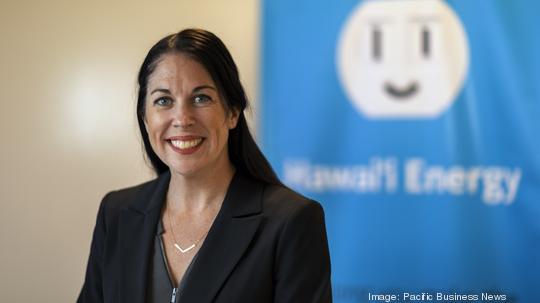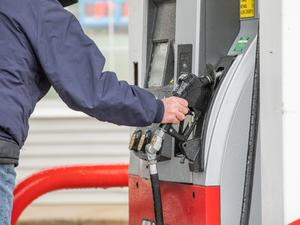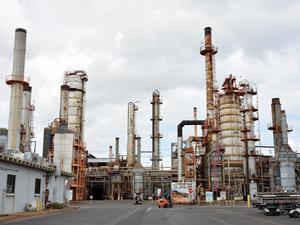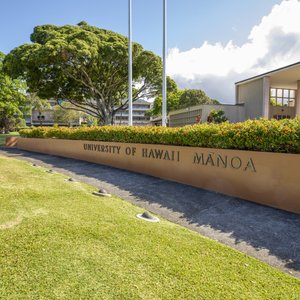
On March 22, Caroline Carl, deputy director of Hawaii Energy, recently stepped into the role of interim executive director, taking the reins from Executive Director Brian Kealoha, who had led the program for six years and is stepping down April 22.
She joined Hawaii Energy in 2011 as the Hawaii County energy adviser who helped Big Island businesses save on electric bills through education and adoption of energy-saving equipment, and transitioned to oversee residential and transformational programs two years later before becoming deputy director in 2015.
The Hawaii Energy program was established in 2008 as part of the Hawaii Clean Energy Initiative and is managed directly by the state Public Utilities Commission. It is funded through, and administers, the Public Benefits Fund, which is collected through a surcharge on electric utility bills, and administers the state’s rebate program for electric vehicle charging stations, funded through the state Legislature.
Carl said the program helps families and businesses in Hawaii “make smart energy choices that save energy, save money and help in our pursuit of our 100% clean energy future.”
Hawaii Energy provides financial incentives and technical assistance for customers to be more energy-efficient. It also currently administers the state's rebate program for electric vehicle charging stations, which is funded through the state Legislature.
What are your priorities as interim executive director?
My priorities are three-fold:
- Facilitate a smooth transition for our team, and support our staff as we move out of the pandemic and focus on cultivating relationships again in person, as well [as] identifying opportunities for growth and innovation.
- Close out our Program Year 2021, which ends on June 30. We have a number of exciting energy-saving efforts that are set to complete over the next few months, and supporting our local businesses and Clean Energy Allies (installers, equipment providers, engineers, etc.) are a must in order to get these over the finish line.
- Finalize Hawaii Energy’s plan for program years 2022-2023, which begins on July 1. Energy efficiency remains a critical resource in our clean energy future and we need to continually evolve our programs to meet changing grid needs. This is even more critical as we face increasing electric bills in the coming months.
How did you get involved in clean energy?
My passion for clean energy started in high school when I took my first environmental science class in my sophomore year. In college, I had the opportunity to travel to Panama for a semester to work more deeply at the intersection of environment and development. It was there I really set my sights on sustainable energy systems. From there, I landed in Kona in 2007 and began working at the Kohala Center across a number of areas in sustainability. The work progressed to energy and waste research and then into collaborative energy education efforts with Hawaii Energy when the programs were just getting off the ground.
What do you like most about what you do?
The work we do is so multi-faceted. Hawaii Energy programs touch all business sectors, driving technology adoption and building workforce capacity through professional development and technical training. We design and implement programs that provide a measurable reduction on businesses’ electric bills, bringing them closer to our clean energy future and resiliency. The programs are making a difference and we get to see the impact of clean energy policy in action every day.
How do you think Hawaiian Electric Co.'s projected rise in electricity bills will impact businesses?
The projected increase in electricity bills is concerning given so many businesses are still struggling and trying to recover from the pandemic. Many business have seen an increase in their energy usage as they keep doors open to increase ventilation, which in the process utilizes much more air conditioning. It is really important for business owners to examine how they are using energy and take steps to reduce that usage.
What steps can businesses take to counteract rising electricity costs and become more energy efficient?
Businesses that have invested in energy-efficient equipment such as lighting, refrigeration and air conditioning systems will be less impacted by anticipated increase. Investment in these technologies provides a solid return in normal times and looks even better when electricity rates increase. I encourage businesses who have not done so to visit our website to learn about ways they can reduce their energy use and receive cash incentives from Hawaii Energy to help offset their investment in efficient equipment.
What other energy-related issues are facing businesses today?
Beyond the energy we use in our offices or in our business facilities there is also the fuel consumption used by business vehicles and especially fleets. There are a lot of great incentives to convert to electric vehicles. Hawaii Energy offers rebates for charging stations businesses make publicly available or use for their fleets. The Hawaii State Energy Office Diesel Replacement Rebate program provides rebates towards the purchase of a new battery-electric vehicle to replace an existing diesel vehicle. Participants are required to scrap the existing vehicle, but it is well worth it as rebates can as much as 45% of the project cost.
Caroline Carl, interim executive director of Hawaii Energy
Address: 45 N. King St., Suite 500, Honolulu, HI 96817
Phone: 808-537-5577
Website: hawaiienergy.com






